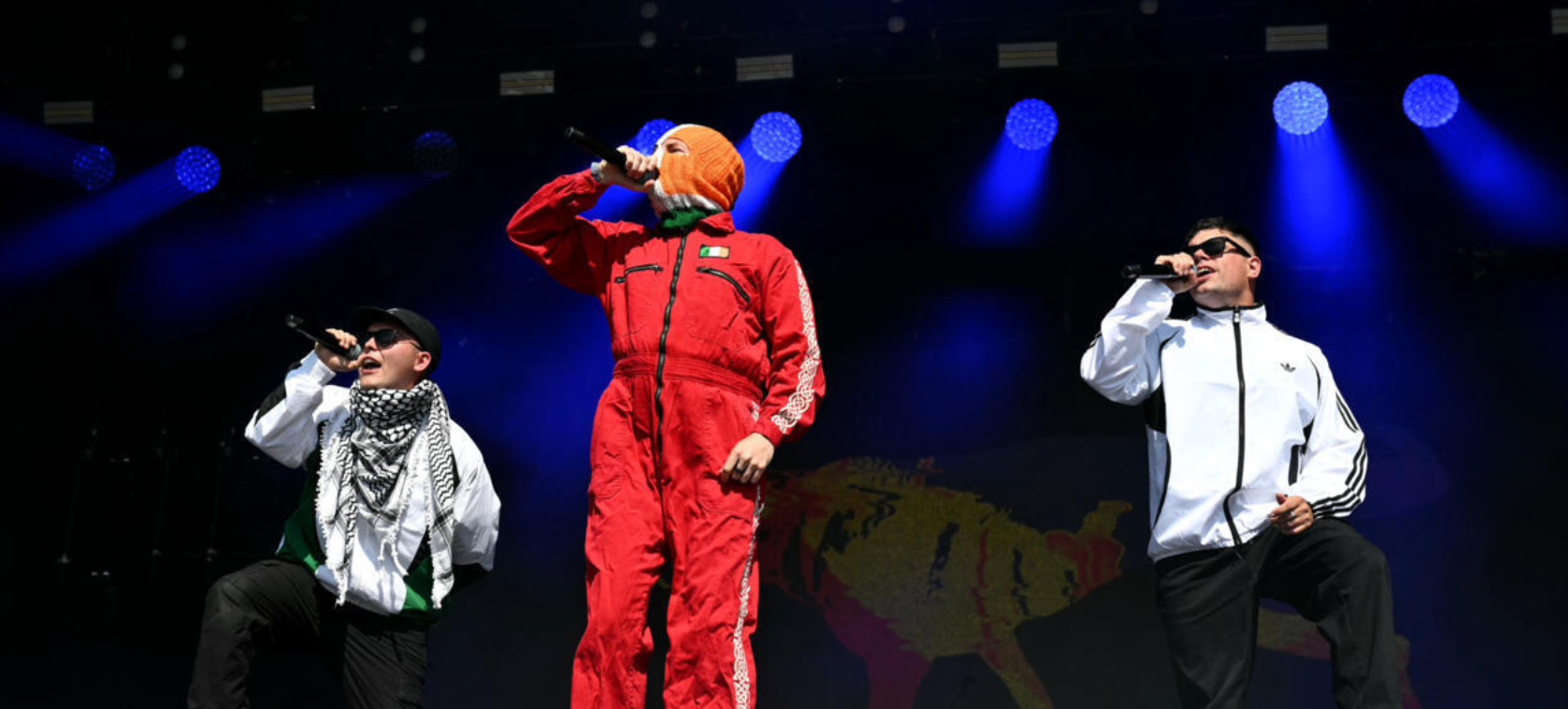“Glastonbury, I’m a free man!”
When Mo Chara shouted those words on the West Holts stage before 30,000 people, it sounded like celebration. But it was really defiance. Days earlier, the Belfast rapper — one-third of the politically charged hip hop group Kneecap — had been charged under UK terrorism laws for allegedly holding a Hezbollah flag at a London gig.
His case is now headed to court. His image is already on T-shirts. And his appearance at Glastonbury — laced with chants of “Free Palestine” and a raised middle finger to the British establishment — has exposed something far bigger than one artist’s legal trouble.
It revealed just how far the British state will go to suppress not only political dissent, but memory itself.
Because when Mo Chara waves a flag, it’s not just a symbol — it’s a reminder. Of Gaza. Of Belfast. Of all the unfinished business of empire. And in Britain today, nothing is more dangerous than a public reminder that the empire ever happened.
Britain’s Deepest Anxiety
The British state has always been uneasy with its past, especially when that past involves occupation, resistance, and loss. Whether in Ireland or Palestine, the story is familiar: partition, military violence, silence, and the criminalisation of those who refuse to forget.
Mo Chara is being prosecuted not because he posed a threat — but because he pierced the veil of denial. A rapper from West Belfast, rapping in Irish, aligning himself with the Palestinian cause and holding a flag associated with resistance — it’s everything the establishment wants erased.
They can’t jail him for reminding people of Britain’s role in arming and shielding Israel. They can’t arrest him for linking the struggles of colonised peoples. So they arrest him for the flag.
This is how the system works: reduce anti-colonial resistance to a question of “extremism,” strip it of its context, and turn the act of remembering into a crime.
Ireland and Palestine: Parallel Wounds
There’s a reason Irish republicans have stood with Palestine for generations. The parallels are too sharp to ignore: occupied lands, military checkpoints, political prisoners, the use of starvation as policy, and the rebranding of self-defence as terrorism.
The British establishment has long tried to sever that connection — not just politically, but emotionally, culturally, historically. To make the Irish forget. To make the British public never know. To cast Palestine as a foreign tragedy instead of an echo of their own imperial record.
So when Mo Chara holds up a flag, it’s not merely provocative — it’s a crack in the official narrative. It’s a reminder that Britain is not just a passive bystander in Gaza’s destruction, but a deeply complicit force.
Glastonbury’s Radical Image Meets the Empire’s Red Lines
Glastonbury has always branded itself as the UK’s spiritual home of rebellion — a place of banners, boots, and anti-establishment energy. But when the state starts deciding who gets to speak on its stages, the cracks in that image become impossible to ignore.
Keir Starmer said Kneecap’s performance was “inappropriate.” Kemi Badenoch called on the BBC to pull the plug. And the BBC, of course, complied — not by banning the set, but by erasing it quietly. Refusing to stream it. Pretending it didn’t exist. That’s how censorship works in 2025 Britain: smooth, silent, disguised as good taste.
But the real problem wasn’t taste — it was truth. Kneecap reminded the crowd that history didn’t start with the Union Jack and won’t end with the poppy. And for that, they were treated as dangerous.
The Flag Isn’t the Threat. Memory Is.
The empire may be dead in paperwork, but it lives on in the insecurities of its former masters. It lives in the way Britain polices symbols and silences artists. It lives in how Gaza is spoken of as a tragedy without naming the weapons that levelled it. It lives in every law that says solidarity must be quiet — or else.
Mo Chara isn’t being punished for violence. He’s being punished for memory. For refusing to forget the famine, the partition, the checkpoints, the sieges — and for connecting them all.
The British state doesn’t fear his mic. It fears what his voice remembers.
Long Live the Lies
The one thing every man, woman, and child in Britain ought to do — before tea, before telly — is lift the carpet. Not to sweep anything under it, but to see what’s already there. Empire, in all its moth-eaten glory. Not the glossy version piped through GB News or sold by Piers Morgan like it’s the greatest thing since sliced bread — but the one the Irish remember with hunger in their bellies and the Palestinians face daily, as famine becomes a foreign policy tool.
The truth? The empire was less a civilising mission and more a smash-and-grab in epaulettes. Its legacy isn’t justice or railways — it’s death, plunder, partition, and policies so cruel they’d make history books blush if they weren’t written by the victors. Its relics sit polished in museum glass, next to medals no child in foodbank Britain will ever eat.
Because here’s the thing: the crown that funded it all — the crown you’re told to respect — will never sit on the heads of the homeless. It won’t tuck in the kids going to bed cold in council flats. It won’t top up the meters running dry in single-parent homes.
But what you will get, without fail, is a Union Jack and a poppy.
Always the symbols. Never the substance.
Long live the lies.
Need Help?
-
[email protected]
-
Follow us on Instagram
-
Follow us on TikTok
